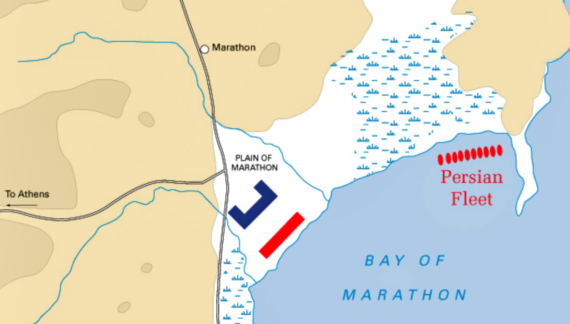Every year, thousands of people across the globe push their physical and mental limits in a 26-mile test of endurance that we call the marathon race. Cities worldwide host these events, giving participants the opportunity to combine their love for running with—let’s be honest—some very questionable decision-making. At least, that’s my humble opinion.
But behind this dramatic test of endurance lies the story of an ancient messenger named Pheidippides.
Pheidippides was an Athenian herald who, according to legend, ran non-stop from the city of Marathon to Athens—about 26 miles—to deliver a crucial message. As the story goes, he burst into the city, delivered his news, and collapsed from exhaustion, never to rise again. This fabled journey gives the modern marathon its distance and iconic name.






Today we might struggle to imagine a world where such extreme efforts were necessary for communication. The marathon serves as a reminder of the lengths to which people once had to go to ensure important messages were delivered. In the modern world, we have the luxury of instant messaging, video calls, and emails. But in the past, messengers like Pheidippides had no such conveniences.
Imagine the scene: The year is 490 BC, and you are a citizen of ancient Athens. The air is thick with worry and anticipation. A great force has risen against your people—the mighty Persian Empire is on the march, and the fate of your city hangs in the balance. You don’t know if your countrymen will be victorious. You don’t know if your home, your family, everything you hold dear, will be safe. All that you know is that your fellow Athenians have gone out to try and stop this formidable foe on the plains of Marathon. The entire city waits with bated breath for any news from the battlefield.
Suddenly, from the distance, a lone figure emerges—a dust-covered, sweat-soaked messenger sprinting with all his might. The city gathers, hearts pounding, desperate to hear the news that will reveal the fate of the city. The messenger bursts through the crowd, and with his final breath, he exclaims, “We have won!” Can you imagine the relief? The joy that sweeps across the city? Where there was fear and despair, there is now hope and courage. The atmosphere is completely transformed.
The ancient Greeks had a word for this kind of life-changing message: euangelion. It means “good message” or “good news.” The Latin translation, Evangelium, eventually became the English word Gospel. This is why Christians gather, preach, and live out their faith—because of the euangelion, the Good News of Jesus Christ. Just as Pheidippides delivered news of victory that transformed a city in crisis, the Gospel announces the greatest victory of all: Christ’s triumph over sin and death, offering salvation, freedom, and eternal life to a world in desperate need.
In Romans 10:13-15, the apostle Paul evokes this ancient theme of a messenger running across rough terrain to bring good news to those anxiously waiting:
“For ‘Whoever will call on the name of the Lord will be saved.’ How then will they call on Him in whom they have not believed? How will they believe in Him whom they have not heard? And how will they hear without a preacher? How will they preach unless they are sent? Just as it is written, ‘How beautiful are the feet of those who bring good news of good things!’”
We all understand the power of good news. Maybe you’ve anxiously awaited the results of a medical test, news from a loved one far away, or the outcome of an important job interview. When the good news finally arrives, everything changes. The weight is lifted, and a surge of relief and joy floods your heart. That is the power of euangelion.
Just as the people of Athens rejoiced at the news of victory from Pheidippides, we rejoice in the ultimate Good News of the Gospel—the message of Jesus Christ. When this Good News reaches us, it changes everything. Where there was once fear and despair, there is now hope, joy, and peace in Him. Sin is forgiven, death is defeated, and new life is available to all who believe. It’s the good news that lifts the burden of our guilt. It’s the good news that gives us courage to face whatever comes our way. It’s the good news that speaks to life’s deepest questions and solves our greatest problem.
In every generation, this message is carried forward by those willing to go the distance, just like Pheidippides. And today, we are called to be those messengers, bringing the Gospel to a world waiting for good news. After all, how beautiful are the feet of those who bring euangelion.
Thessalon ON

